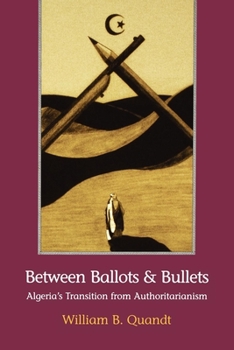Between Ballots and Bullets: Algeria's Transition from Authoritarianism
Select Format
Select Condition 
Book Overview
" In the Arab world as elsewhere, authoritarian regimes have come under pressure for change. As yet, however, democracy has not taken root as an alternative form of governance. This book on Algeria looks at both the erosion of the authoritarian model and the difficulties of making a transition to democracy. Within the past decade, Algeria experienced one of the most promising experiments of opening up the political system and allowing a remarkable...
Format:Hardcover
Language:English
ISBN:0815773021
ISBN13:9780815773023
Release Date:July 1998
Publisher:Brookings Institution Press
Length:216 Pages
Weight:0.70 lbs.
Dimensions:0.8" x 6.3" x 9.3"
Customer Reviews
5 ratings
Outstanding Introduction to Modern Algerian History
Published by Thriftbooks.com User , 20 years ago
Outstanding book. As a narrative, I recommend this book to anyone with little to no knowledge of post-World War II Algerian history as it's both extremely short yet packed with information, a benchmark for the topic. Yet, as an analysis of Algerian politics, Quandt's book is so remarkably perceptive, that it deserves a permanent spot in the library of the serious scholar, the history buff, the political science classroom, and for anyone interested in Islamic or North African culture.
To the point
Published by Thriftbooks.com User , 22 years ago
William Quandt has produced a brief look at the Algerian crisis that will give the reader with a time deficit a chance bone up quickly and accurately.
A Concise and Detailed Account
Published by Thriftbooks.com User , 23 years ago
Between Ballots & Bullets by William Quandt is an excellent and exhaustive study of Algeria's transition from authoritarianism. The book is split into two parts: political history and political analysis. In Part I, the reader gets an excellent political history of the country, beginning with the struggle for independence from France all the way to aftermath of the 1997 elections (the book was published in 1998). In Part II, Quandt offers contending "perspectives" for analyzing Algeria's plight. He details cultural, socioeconomic and political explanations for the situation, while taking care never to dismiss the power of human agency and contextualized choice. In this book review, I will briefly summarize the book, review Quandt's style, and propose future implications for Algeria based on the knowledge I have gained. It almost seems repetitive to give a summary of this book, because Quandt is extremely concise. He begins with a political account of the Algerian struggle for independence. He observes, ...the revolution that was launched November 1, 1954 was not only against the French, but also against the existing political institutions that Algerians had forged over the previous generation. In its origins, the Algerian revolution was antipolitics and antiparty. (18) This observation is important because it helps the reader understand the importance of nationalism in the revolution. The Algerians did not fight with a detailed governance plan in their back pocket. Rather, they fought for a chance to establish themselves as independent people. After discussing the Revolution and its rhetorical emphasis on unity, Quandt moves into the Boumedience Era. He notes that Algeria's first president, Ben Bella, lacked an institutional base of support and spent much of his time in office manipulating factions against each other. Ben Bella quietly faded into the background and Boumediene arose as the stable and rather "faceless" leader. He downgraded the FLN (the party credited with winning independence) in importance and suppressed any emerging opposition to his regime. Indeed, after 1968, there was very little internal opposition. During the 1970s, his regime had an Islamic cultural orientation but functioned in a secular socialist manner. There was definitely not much emphasis on a transition to democracy, but "Boumedience, at least, had brought stability to a country that had known far too much political violence" (29). In the next chapter, Quandt explains that there was inevitable pressure to change, and Boumediene, as an authoritarian ruler, was unable to enact it. Chadli Benjedid became president in 1979, and long-suppressed demands for change came with the Berber spring of 1980. This initial movement for the rights of Berber-speaking people gave rise to other political movements, the most significant being the Algerian Islamic Movement. Beginning in 1982, the Islamic Movement t
Fantastic; highly recommeneded
Published by Thriftbooks.com User , 25 years ago
Ballots and Bullets is only one of several books I have read dealing with Algerian Politics recently, and it amazed me how Quandt was able to grasp the fundamental themes of the transition Algeria has made in the past years. Quandt has a perspective on the subject that had never entered my mind before, and he explains it in the most comprehensive manner possible.
This is the most amazing book i have ever read about algeria
Published by Thriftbooks.com User , 26 years ago
Quandt explains, very thouroughly, just how Algeria transformed from authoritarianism. He writes so clearly and beautifully about the subject that you get the feeling that he is the only one who knows anything about this subject, which i am sure he is.





